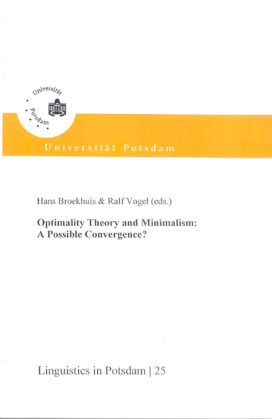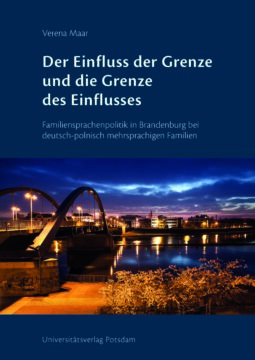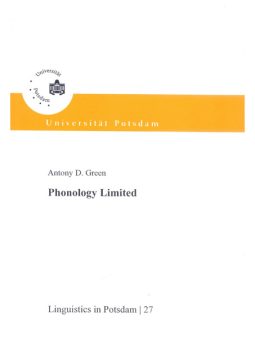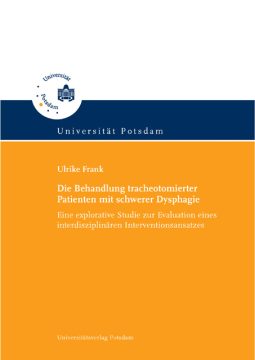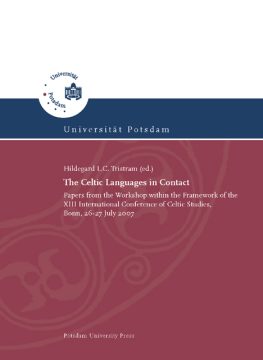This issue of Linguistics in Potsdam contains a number of papers that grew out of the workshop Descriptive and Empirical Adequacy in Linguistics held in Berlin on December 17-19 December, 2005. One of the goals of this meeting was to bring together scholars working in various frameworks (with emphasis on the Minimalist Program and Optimality Theory) and to discuss matters concerning descriptive and empirical adequacy. Another explicit goal was to discuss the question whether Minimalism and Optimality Theory should be considered incompatible and, hence, competing theories, or whether the two frameworks should rather be considered complementary in certain respects (see http://let.uvt.nl/deal05/call.html for the call for papers). Five of the seven papers in this volume directly grew out of the oral presentations given at the workshop. Although Vieri Samek-Lodovici’s paper was not part of the workshop, it can also be considered a result of the workshop since it pulls together some of his many comments during the discussion time. The paper by Eva Engels and Sten Vikner discusses a phenomenon that received much interest from both minimalist and optimality theoretic syntax in the recent years, Scandinavian object shift. The paper may serve as a practical example for a claim that is repeatedly made in this volume: minimalist and OT analyses, even where they might be competing, can fruitfully inform each other in a constructive manner, leading to a deeper understanding of syntactic phenomena.
Ralf Vogel, Hans Broekhuis, Eva Engels, Jane Grimshaw , Vieri Samek-Lodovici , Alona Soschen, Pius ten Hacken , Sten Vikner
Ralf Vogel; Hans Broekhuis (Hrsg.)
A possible convergence?
ISBN: 978-3-939469-54-4
231 Seiten
Erscheinungsjahr 2006
Reihe: Linguistics in Potsdam , 25
9,00 €
Nicht steuerbarer Umsatz entsprechend § 1 (1) UStG in Verbindung mit § 2 (3) UStG a.F. Die Universität Potsdam bildet im Rahmen dieser Leistungserbringung keinen Betrieb gewerblicher Art entsprechend § 1 (1) Nr. 6 bzw. § 4 KStG. Im Fall der nachträglichen Einstufung als Betrieb gewerblicher Art behalten wir uns das Recht vor, die Umsatzsteuer ergänzend in Rechnung zu stellen. zzgl. Versandkosten
This issue of Linguistics in Potsdam contains a number of papers that grew out of the workshop Descriptive and Empirical Adequacy in Linguistics held in Berlin on December 17-19 December, 2005. One of the goals of this meeting was to bring together scholars working in various frameworks (with emphasis on the Minimalist Program and Optimality Theory) and to discuss matters concerning descriptive and empirical adequacy. Another explicit goal was to discuss the question whether Minimalism and Optimality Theory should be considered incompatible and, hence, competing theories, or whether the two frameworks should rather be considered complementary in certain respects (see http://let.uvt.nl/deal05/call.html for the call for papers). Five of the seven papers in this volume directly grew out of the oral presentations given at the workshop. Although Vieri Samek-Lodovici’s paper was not part of the workshop, it can also be considered a result of the workshop since it pulls together some of his many comments during the discussion time. The paper by Eva Engels and Sten Vikner discusses a phenomenon that received much interest from both minimalist and optimality theoretic syntax in the recent years, Scandinavian object shift. The paper may serve as a practical example for a claim that is repeatedly made in this volume: minimalist and OT analyses, even where they might be competing, can fruitfully inform each other in a constructive manner, leading to a deeper understanding of syntactic phenomena.
Das könnte Sie auch interessieren
-
 2024
2024Der Einfluss der Grenze und die Grenze des Einflusses
22,50 €Nicht steuerbarer Umsatz entsprechend § 1 (1) UStG in Verbindung mit § 2 (3) UStG a.F. Die Universität Potsdam bildet im Rahmen dieser Leistungserbringung keinen Betrieb gewerblicher Art entsprechend § 1 (1) Nr. 6 bzw. § 4 KStG. Im Fall der nachträglichen Einstufung als Betrieb gewerblicher Art behalten wir uns das Recht vor, die Umsatzsteuer ergänzend in Rechnung zu stellen.
zzgl. Versandkosten
In den Warenkorb -
 2007
2007Phonology Limited
9,00 €Nicht steuerbarer Umsatz entsprechend § 1 (1) UStG in Verbindung mit § 2 (3) UStG a.F. Die Universität Potsdam bildet im Rahmen dieser Leistungserbringung keinen Betrieb gewerblicher Art entsprechend § 1 (1) Nr. 6 bzw. § 4 KStG. Im Fall der nachträglichen Einstufung als Betrieb gewerblicher Art behalten wir uns das Recht vor, die Umsatzsteuer ergänzend in Rechnung zu stellen.
zzgl. Versandkosten
In den Warenkorb -
 2008
2008Die Behandlung tracheotomierter Patienten mit schwerer Dysphagie
9,50 €Nicht steuerbarer Umsatz entsprechend § 1 (1) UStG in Verbindung mit § 2 (3) UStG a.F. Die Universität Potsdam bildet im Rahmen dieser Leistungserbringung keinen Betrieb gewerblicher Art entsprechend § 1 (1) Nr. 6 bzw. § 4 KStG. Im Fall der nachträglichen Einstufung als Betrieb gewerblicher Art behalten wir uns das Recht vor, die Umsatzsteuer ergänzend in Rechnung zu stellen.
zzgl. Versandkosten
In den Warenkorb -
 2007
2007The Celtic Languages in Contact
14,50 €Nicht steuerbarer Umsatz entsprechend § 1 (1) UStG in Verbindung mit § 2 (3) UStG a.F. Die Universität Potsdam bildet im Rahmen dieser Leistungserbringung keinen Betrieb gewerblicher Art entsprechend § 1 (1) Nr. 6 bzw. § 4 KStG. Im Fall der nachträglichen Einstufung als Betrieb gewerblicher Art behalten wir uns das Recht vor, die Umsatzsteuer ergänzend in Rechnung zu stellen.
zzgl. Versandkosten
In den Warenkorb
Verlag kompakt
Kontakt
Universitätsbibliothek Potsdam
Universitätsverlag
Am Neuen Palais 10
14476 Potsdam
verlag@uni-potsdam.de
0331 977-2094
0331 977-2292

